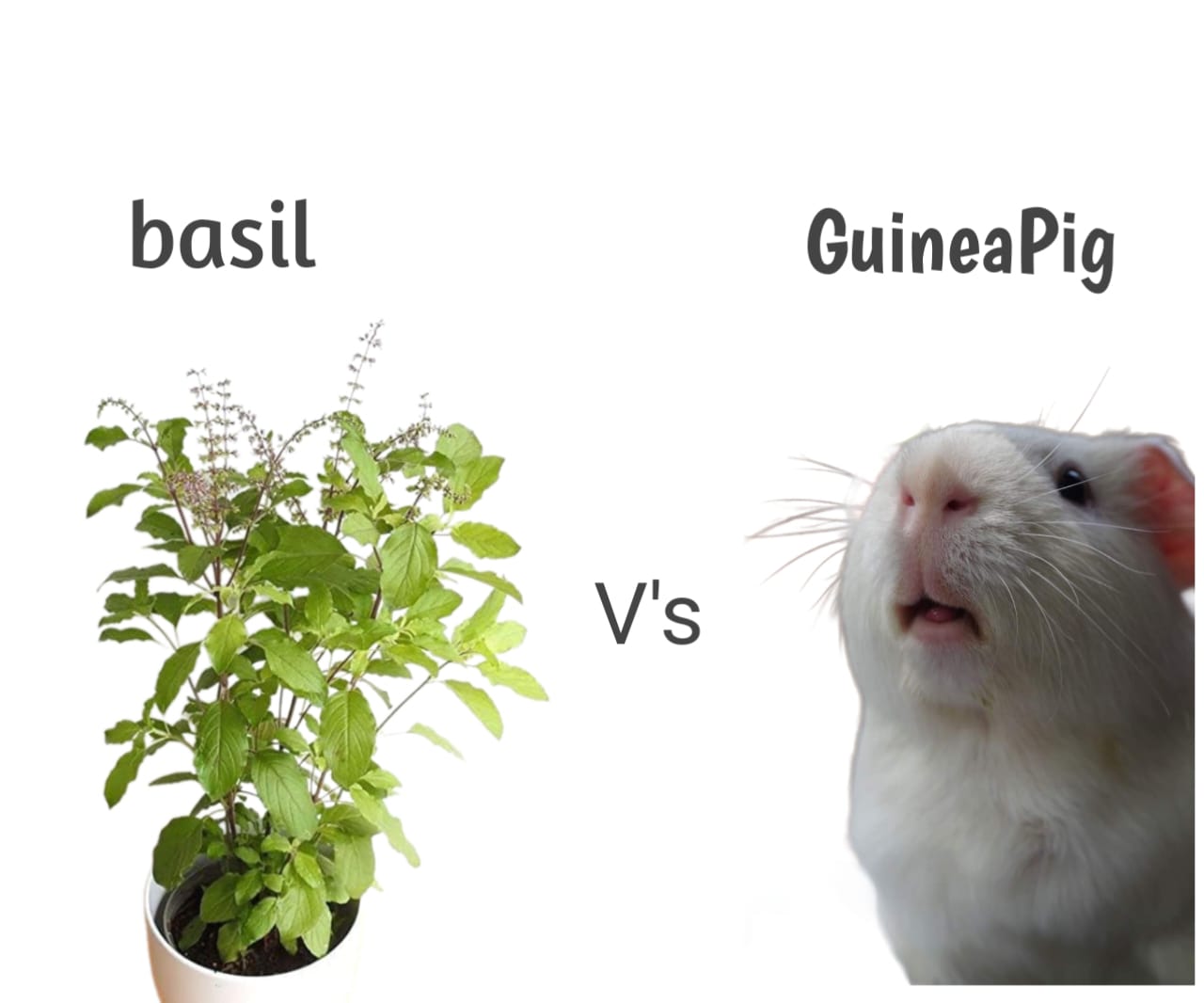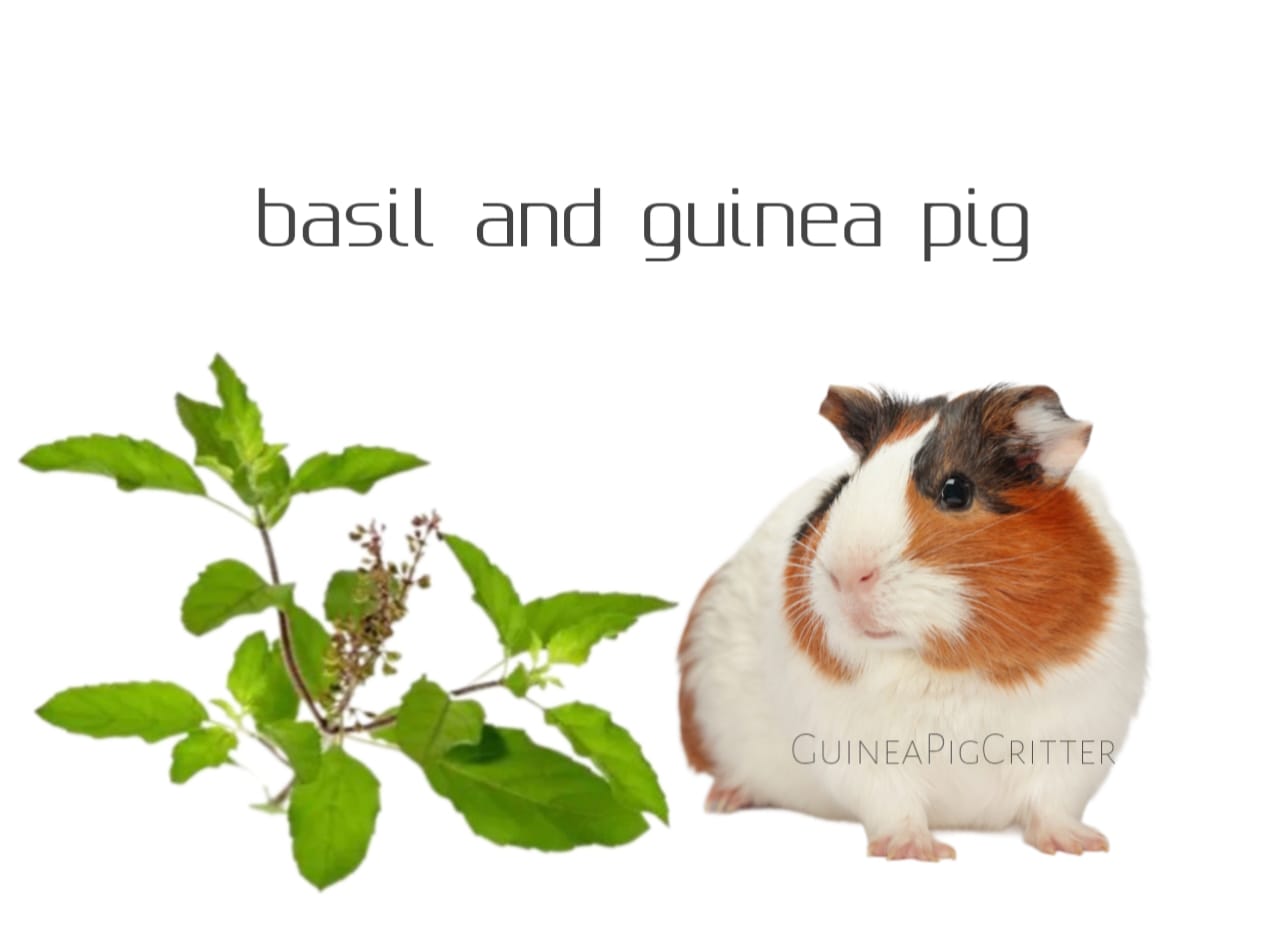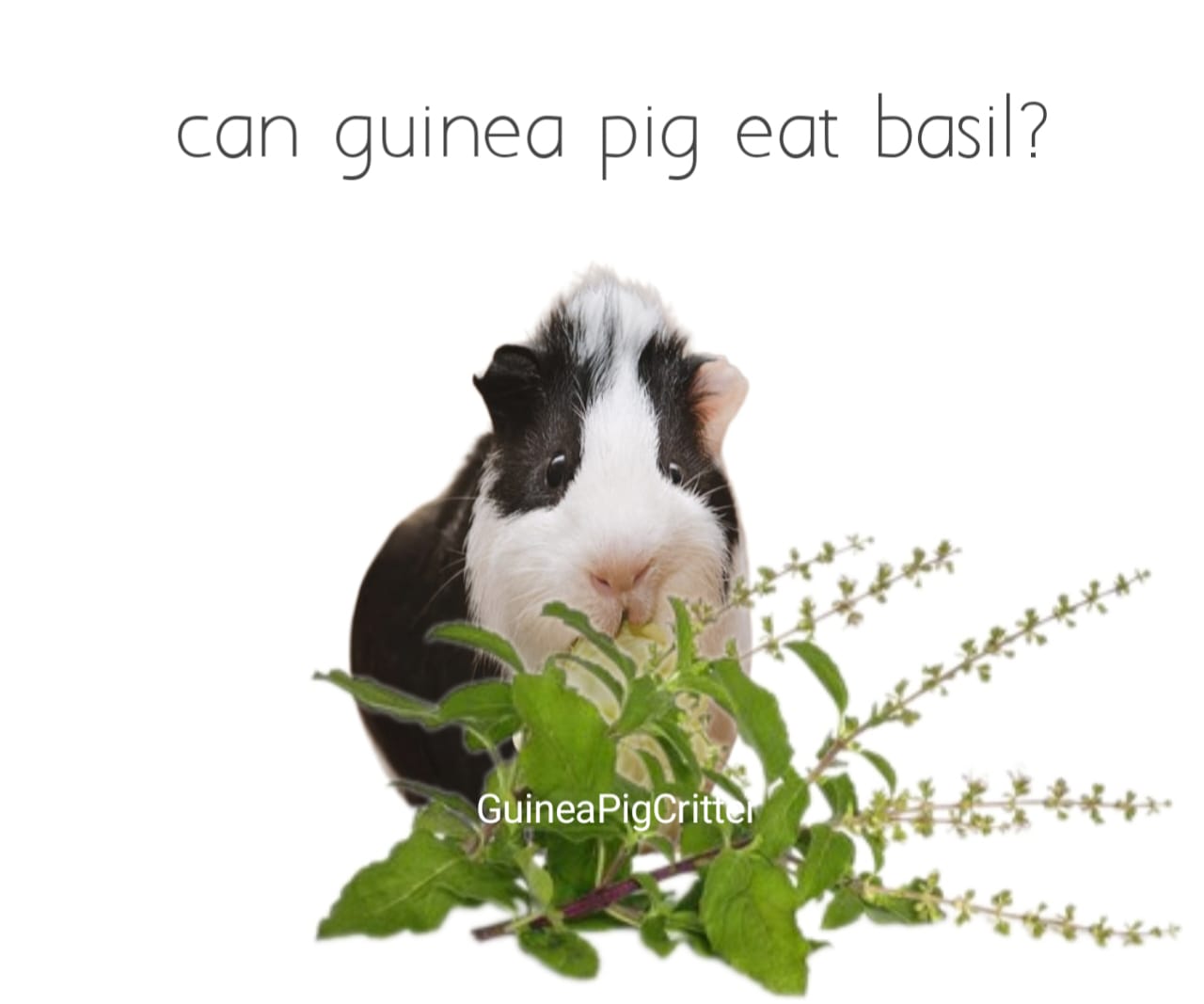Pets like guinea pigs have particular food requirements. Guinea pigs are herbivores, meaning they rely on hay, fresh vegetables, and fruits that are fortified with pellets. Can guinea pigs eat basil? Basil is a culinary herb known for its aromatic leaves that’s often used to flavor dishes. But can you feed it to your guinea pig? In this detailed guide, we will go through everything you need to know about feeding basil to your guinea pig including its advantages in terms of nutrition as well as risks that may be associated with it.
So, Today’s Question is:- can guinea pig eat basil?
When taking care of guinea pigs, knowing what they can eat and what they can’t are very important. These small furry animals have delicate digestive systems which mean not all the foods safe for humans or other animals will be safe for them too.
A complete balanced diet for a guinea pig should mainly comprise of high-quality hay, fresh veggies and limited quantity of fruits and pellets. Not all greens are made equal though leafy greens form an integral part of their diet plan. Could a guinea pig eat basil?
Basil, with its aromatic leaves and strong taste is a common ingredient in many kitchens. Nevertheless, before you give it to your guinea pig, it is important to know the nutritional value of basil and how it might affect your pet’s health.
This blog post will explore extensively the advantages and disadvantages of feeding guinea pigs with basil leaves, recommended quantities for consumption and best way to introduce it into their meal.
Also read :-Can a Guinea Pig Drink Apple Juice?
Nutritional profile of basil
Other than being a tasty herb, basil also contains some essential nutrients that have benefits when ingested in moderation by your guinea pig. Below are some of the nutrition aspects contained in this herb and how they impact on your guinea pig’s health.
Vitamins:
Vitamin a: this is good for vision, skin care and an immune system that works well in guinea pigs; thus; some amount of vitamin a is found in basil. Nevertheless, too much vitamin a can be detrimental hence good considerations must be observed regarding what they eat.
Vitamin k: blood clotting and bone health are dependent on this particular vitamin. Thus basil supplies them with enough vitamin k which supports the overall maintenance of a healthy guinea pig.
Vitamin c: although basil does contain some vitamin c, the amount is not sufficient to meet the requirements of guinea pigs. Scurvy can only be avoided by supplying vitamin c to guinea pigs on a regular basis because they cannot synthesize their own. Basil can act as an additional source but it should not be the main one.
Minerals:
Calcium: as far as calcium is concerned, basil does have high levels of it, which contributes towards building strong bones and teeth. Nonetheless, an excess in calcium causes bladder stones in aging guinea pigs. This therefore calls for caution when feeding your pet too much basil.
Iron: iron is majorly used in formation of hemoglobin that carries oxygen through blood circulation. Basil may therefore provide small amounts of iron to contribute to your guinea pig’s well-being.
Antioxidants:
As a result, basil contains antioxidants such as flavonoids and polyphenols that fight against free radicals and reduce inflammation. These antioxidants can help your guinea pig keep vibrant and safe health wise maintaining its good immunity.
Is basil safe for guinea pigs?
To put it briefly, yes, basil is edible by guinea pigs without any problem. However, just like many other foods, give it sparingly. Finally remember that apart from the various benefits you derive from feeding your pet with this plant there are also some things you need to keep in mind so that you maintain healthy guinea pig.
Benefits of giving your guinea pig basil
Variety of taste: guinea pigs can be bored with the same diet every day. Basil has a different flavor and texture for variety during their meals.
Digestive benefit: basil contains fibers which increase the digestion rate, thus ensuring that your pet’s digestive system does not clog up.
Immune boosting: antioxidants and vitamins from basil are helpful in building strong immunity towards diseases among guinea pigs.
However, these benefits make it crucial to bear in mind that all guinea pigs do not react to basil in the same way. There may be some who like basil, others may be indifferent while a few could have mild discomforts for it. Therefore, always keenly observe your guinea pig’s response when introducing new food items.

How much basil should guinea pigs eat?
Avoid overfeeding your pet guinea pig on any herb including basil.
Approximate serving size:
A small sprig or two leaves of basil per week is enough for many guinea pigs to get full benefits such as taste and nutritional support without getting overwhelmed.
Frequency
Basil may serve as an occasional treat or supplement. Unlike hay or leafy vegetables like romaine lettuce and cilantro, it’s not meant to be a staple food. The right quantity of basil should be taken once or twice per week.
Importance of moderation
Though healthy, high levels of calcium in basil can pose dangers if consumed in excess. Guinea pigs can develop bladder stones due to excessive intake of calcium. To prevent this condition, minimize your pet’s exposure to basil and other foods that have high levels of calcium.
Potential risks of feeding basil
While basil is generally given to guinea pigs with no major issues, there are a few risks involved. This information will aid you when deciding on what the animal should eat.
Digestive upset
Just like humans, some guinea pigs may experience digestive upset when they are presented with different kinds of foods such as basil. Some signs that your pet might be experiencing digestive issues include loose stool, bloating and loss of appetite. If you see any signs indicating these conditions stop feeding your pet with basil and seek assistance from a veterinary officer without delay.
Bloat
If they are not used to basil, it may cause flatulence and bloating in guinea pigs like any other leafy green. Guinea pigs may become uncomfortable or even in some cases severely ill due to bloat. Take baby steps by giving a small amount of basil at a time to minimize the chances.
Pesticide residue
Guinea pig’s health can be compromised by these chemicals resulting from exposure to pesticide residues on basil leaves among other herbs and vegetables. Prior to feeding your pet rabbit, ensure that you always wash it completely on running water. If possible, try organic basil that has minimal risk.
Calcium content
It was stated earlier that basil is relatively high in calcium. Nonetheless, excessive quantities of calcium could lead to bladder stones. For guinea pigs with urinary problems or those prone to bladder stones, close attention should be given to their calcium intake levels. In case your guinea pig is at risk for this condition, consider restricting its access to or avoiding eating basil altogether.
How to introduce basil into a guinea pig’s diet
One option is too steeply increase the number of things you feed your hamster so as not shock its system and introduce new food items gradually; in order for it not been taken aback by the introduction of something new into the diet of an animal which is used to eating just one type of food for all its life, slowly add some little amounts;
Start small:
You can start with a single leaf or a small piece of basil. Watch for any discomfort in digestion or allergic reactions. If your guinea pig seems to enjoy the taste of basil and does not show any ill effects, you may gradually increase the amount.
Blend it:
If you want to transition smoothly, you can mix the basil with other vegetables that are already liked by your guinea pig. This can help them familiarize themselves with the taste.
Watch their health:
Keep an eye on their overall health and behavior after introducing basil to them. If you notice any changes such as reduced appetite, different stool consistency, or signs of distress, stop serving basil and consult your vet.
Rotate basil with other herbs:
To make their diet more diverse and exciting include basil in rotation with other safe herbs like parsley, cilantro or mint. It provides your pet’s system with various nutrients and flavors without overdosing on one ingredient.
Basil substitutes
If you are thinking about adding some variety to your guinea pig’s diet in terms of herbs and leafy greens, there are many options available that will not harm him/her. Here are several other than basil:
Parsley:
Parsley is safe for guinea pigs in moderation and contains vitamin c. Like basil, it must be given out sparingly due to its high calcium levels.
Cilantro:
Another herb that guinea pigs tend to love is cilantro. It is not rich in calcium and vitamin c making it an excellent substitute for basil leaves.
Mint:
Guinea pigs can eat mint leaves since they are safe to them and have a great taste. Nonetheless, because of the strong flavor it may possess, mint should be fed carefully since this might be too overpowering for some guinea pigs.
Dandelion greens:
Many guinea pigs are fond of dandelion greens. They contain lots of nutrients but like basil they also have a lot of calcium which makes the need for regulation important.
Romaine lettuce:
Romaine lettuce is one the safest green leafy vegetables you can give your cavy any time. Additionally, romaine lettuce contains less calcium so it can be served more than once unlike herbs such as basil.
Check also :-Can guinea pig eat lettuce?
By alternating these herbs and green leafy vegetables, you ensure that your pet takes balanced diet consisting of various flavors and textures.

FAQ
Can baby guinea pigs eat basil?
Yes, baby guinea pigs should not be allowed to eat basil immediately, though if given at all it ought to be done gradually. This is because their digestive systems are still under developed and need close monitoring due to their delicate nature when compared with older ones which may have fully grown intestines that are able to digest complex food materials without strain.
Can basil stems and flowers be consumed safely?
However, guinea pigs also can eat the stems and flowers of basil. Nevertheless, these might not be as tasty to them as leaves hence it is better to go for the leafy parts.
How frequently can basil be part of their diet?
Since it’s a treat, feed your guinea pig with basil once or twice in a week. This way, you can let your pet enjoy the goodness of basil while maintaining a healthy diet.
What if my guinea pig doesn’t like basil?
Do not worry if your guinea pig doesn’t like the taste of basil as it can happen. In this case, there are several other herb options such as parsley, cilantro; or romaine lettuce.
Is it possible that guinea pigs get allergies from basil?
Although very rare cases may occur where some guinea pigs might have an allergic reaction to certain herbs including basil. So, if you notice swelling on their skin or difficulty in breathing you should immediately discontinue giving them basil leaves and consult a vet for advice.
Conclusion
Accordingly, guinea pigs can they eat basil? Yes, but no without some caution. Basil can be introduced in little amounts to the diet of your guinea pig as a healthy addition that has taste. Although it is important to know about its high level of calcium and its digestive problems.
Regarding basil, as with any new food introduce it slowly to your piggy and watch for any signs of discomforts or adverse reactions. Besides, before giving it to the pet you have to wash it thoroughly because there can be pesticides in herbs’ leaves too and try switching them with other edible greens once in a while so that it wouldn’t be boring.


